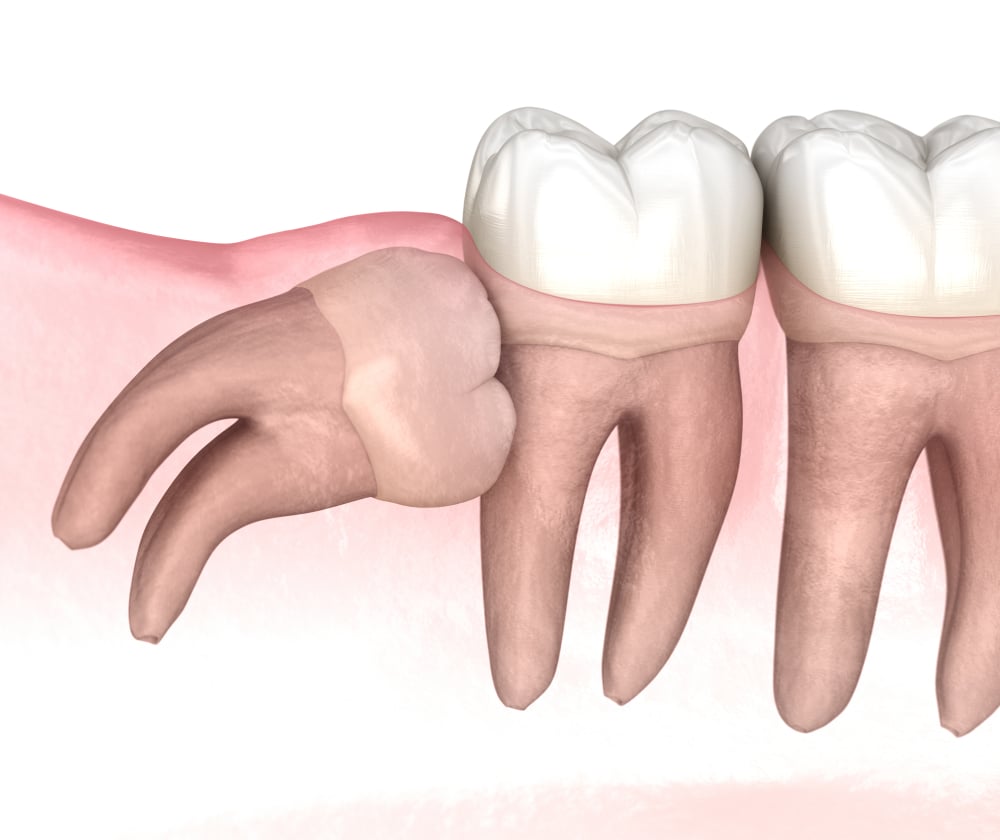Wisdom tooth removal surgery is one of the most common dental surgeries in the world. Wisdom tooth extraction is defined as a procedure, conducted through surgery, to remove either one or more of the wisdom teeth from an individual’s mouth.

What are wisdom teeth?
Wisdom teeth are the four permanent teeth, which are located at the back corners of your mouth. Two are located on the top ends while the other two are located on the bottom ends.
They are third molars and are the last teeth that erupt in the mouth of an individual. The rest of the permanent teeth take less time to appear. When you are between the age of 17 to 25, wisdom teeth will usually appear in your mouth. In some rare cases, individuals get them either at a later stage in life or they simply never have them.
Normally wisdom teeth erupt and grow just like any other tooth in the mouth. They do not require any special care or attention.
Growth of impacted wisdom tooth
Many people tend to develop impacted wisdom teeth. Impacted wisdom teeth are the teeth that did not have enough space to erupt in the mouth to develop in the natural and normal fashion. Because of less space or crowding of teeth in the mouth, impacted wisdom teeth might appear partially or not at all.
An impacted wisdom tooth might:
- Develop at an angle towards the second molar (next tooth)
- Develop at an angle towards the back of the mouth
- Grow either down or straight just like rest of the teeth but get trapped in the jawbone
- Grow at a 90 degrees angle to other teeth, making it look as if the tooth is lying down

Problems that occur with an impacted wisdom tooth
When you do have impacted wisdom tooth or teeth, it results in a number of issues. Here are some of the most common problems that occur:
- Excruciating pain in the tooth
- Tooth decay (when the wisdom tooth has appeared partially)
- Damage to the surrounding bone or nearby tooth
- Oral infections
- Gum diseases
- Complications in applying orthodontic treatments
- Development of cyst around the tooth
Why wisdom tooth removal surgery?
If you are facing any of the issues mentioned above because of an impacted wisdom tooth, it is important that you consult with your dentist. Taking care of your oral health is important and if a dental issue occurs that can exacerbate over time, it is crucial that you take charge of the situation and not take it lightly.
Although dental specialists are divided on wisdom teeth that are not causing any problem to an individual, there is no debate when it comes to an impacted wisdom tooth that is causing issues to you.
- Here are some of the reasons:
- Gum disease due to impacted wisdom teeth might worsen
- Serious dental complications might occur in a later stage of life
- Difficulty in doing any surgeries
- As it becomes difficult to clean the tooth, it affects the oral health
The procedure
Once you have consulted with your dentist and they advise you to go through wisdom tooth removal surgery, the first step is to stay calm. Do not get frightened just because it is surgery. It is one of the most common dental surgeries in the world and comes with almost no complications.
The procedure might be conducted by your dentist in his office. In other cases, if your impacted tooth needs an in-depth surgical procedure, the dentist might advise you to see an oral surgeon. The procedure is an out-patient surgery, which means you don’t have to stay in the dental clinic overnight and can simply go home the same day.

The first step of the procedure is making the affected area of mouth numb. There are three types of anesthesia available. Your dentist or oral surgeon will choose the one best suited:
- Local anesthesia: while you will be awake and can feel movement and pressure, you won’t feel any pain during the procedure.
- Sedation anesthesia: you might also be given sedatives to help you feel relaxed and comfortable. You will have no to the limited memory of the surgery.
- General anesthesia: this is given only in certain conditions. You will have no memory and no pain during the procedure.
During the extraction process, your dentist or oral surgeon will:
- Make an incision in your gum tissue, which will expose the bone and tooth
- Remove the bone that results in blockages of access to the tooth root
- If the tooth cannot be removed in one go:
- Divide the tooth into smaller parts
- Remove the impacted tooth from the mouth
- Clean the site of the tooth and get rid of any debris from the bone or tooth
- Stitch the wound caused by incision
- Place gauze over the extraction site to stop bleeding
The healing process after surgery
Recovery time is different for every person who goes through wisdom tooth removal surgery. The general road map of the healing process is:
- First 24 hours after the surgery: blood clots form
- 2 to 3 days: swelling of mouth and cheeks would reduce
- 7 days: the dentist will remove your stitches (if you got them)
- 7 to 10 days: soreness and stiffness in your jaw will go away
- 2 weeks: bruising on the face will have healed
Here are some of the things that you should avoid:
- Brushing teeth that are close to the extraction site
- Drinking any hot drinks
- Rinsing
- Eating food that requires excessive chewing
- Avoiding smoking or drinking alcohol
- Avoiding sucking on straws
If you are looking for medical advice diagnosis, look no further than iSmile. We have a team of some of the best implant dentists in NYC, oral surgeons, and dentists. They will listen to your dental problems and advise you with solutions and treatments to help you get rid of the pain.
We hope you have amazing oral health and never take it for granted.

.png?width=800&name=Untitled%20design%20(3).png)

